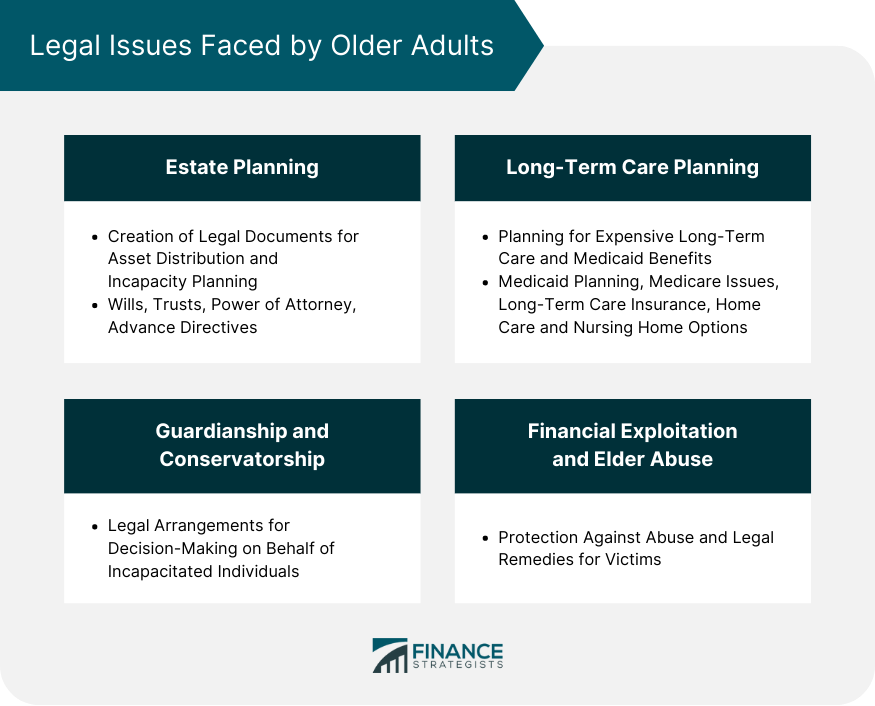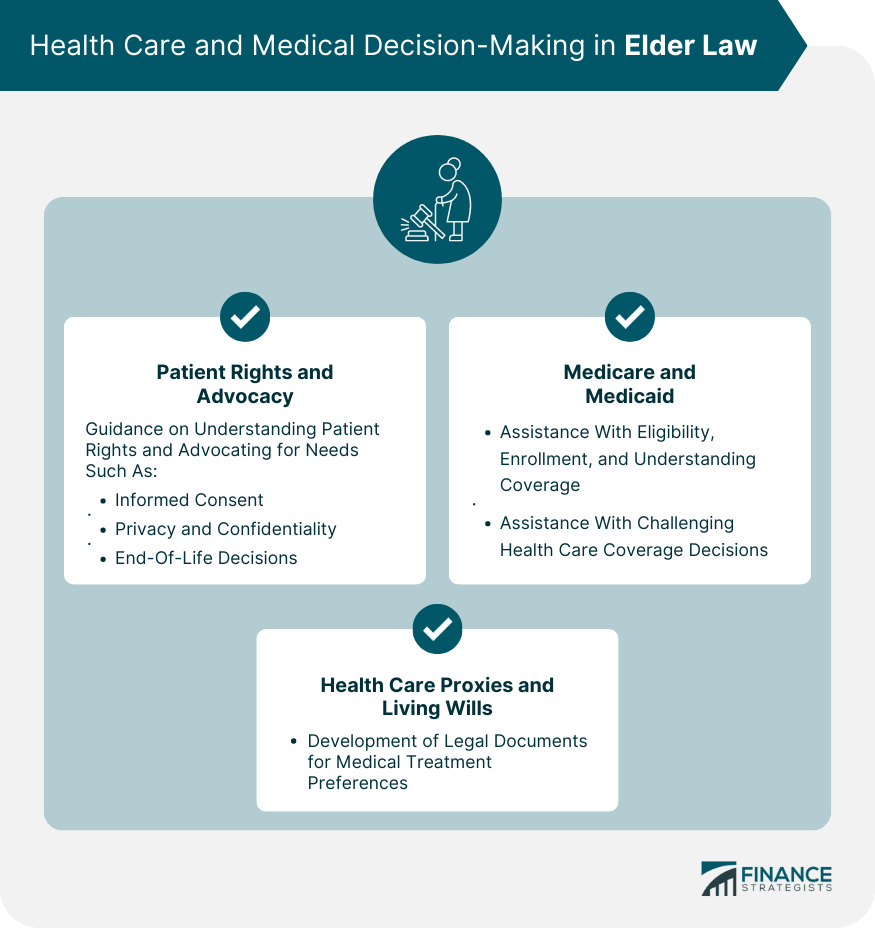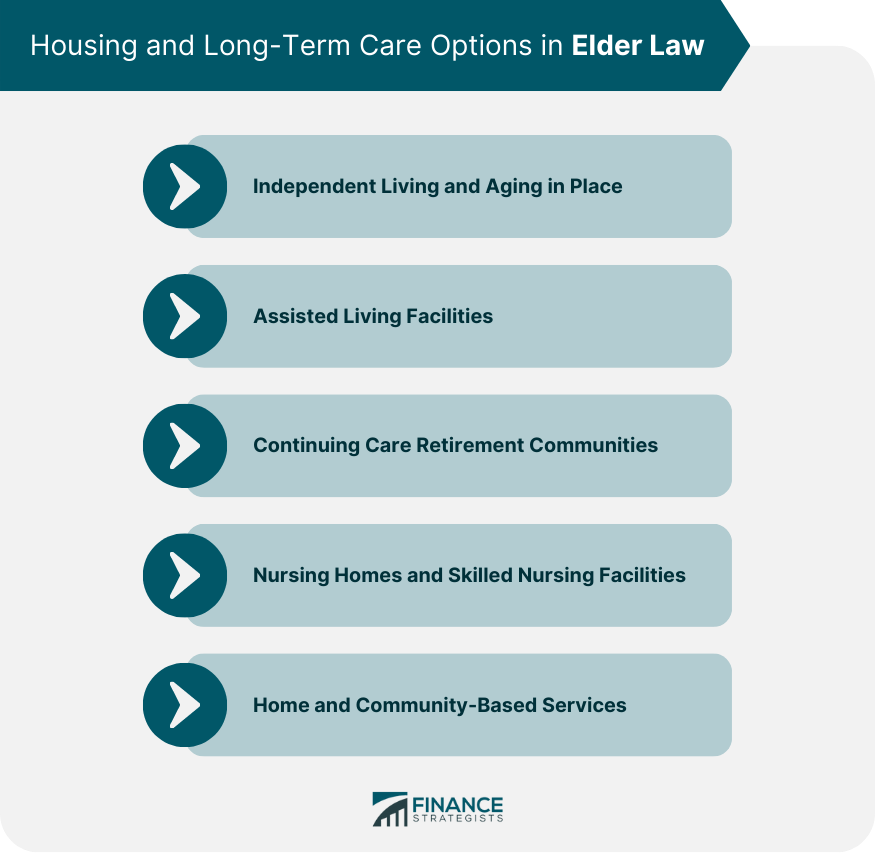What Is Elder Law?
Elder law is a specialized area of law that focuses on the legal issues that older adults face. This area of law encompasses a wide range of legal issues, including estate planning, long-term care planning, guardianship and conservatorship, financial exploitation, and elder abuse.
Elder law also addresses social security and retirement benefits, health care and medical decision-making, housing and long-term care options, and special needs planning.
Importance of Elder Law in an Aging Society
Elder law is becoming increasingly important in an aging society.
As the population of older adults continues to grow, the need for specialized legal services that focus on their unique needs becomes more important.
Elder law attorneys can help older adults navigate complex legal issues related to estate planning, long-term care planning, guardianship, and conservatorship. They can also provide legal representation in financial exploitation and elder abuse cases.
Role of Elder Law Attorneys
Elder law attorneys play a critical role in addressing the legal needs of older adults. They provide legal representation in a variety of areas, including estate planning, long-term care planning, guardianship and conservatorship, financial exploitation, and elder abuse.
Elder law attorneys can also assist older adults with social security and retirement benefits, health care and medical decision-making, housing and long-term care options, and special needs planning.
Legal Issues Faced by Older Adults
Estate Planning in Elder Law
Estate planning is a critical component of elder law. It involves the creation of legal documents that outline an individual's wishes for the distribution of their assets upon their death.
Estate planning can also address issues related to incapacity and medical decision-making.
Wills
A will is a legal document that outlines an individual's wishes for the distribution of their assets upon their death. It can also include provisions related to guardianship of minor children and medical decision-making in the event of incapacity.
Trusts
A trust is a legal arrangement in which a trustee holds and manages assets on behalf of a beneficiary.
Trusts can be used to manage assets during an individual's lifetime and distribute assets upon death. Trusts can also be used to minimize taxes and protect assets from creditors.
Power of Attorney
A power of attorney is a legal document that grants another person the authority to make financial and legal decisions on behalf of an individual. This document can be used in the event of incapacity or disability.
Advance Directives
Advance directives are legal documents that outline an individual's wishes for medical treatment in the event of incapacity.
These documents can include living wills, which outline an individual's preferences for end-of-life care, and health care proxies, which appoint another person to make medical decisions on behalf of an individual in the event of incapacity.
Long-Term Care Planning in Elder Law
Long-term care planning is another important component of elder law. It involves planning for long-term care, which can be expensive and quickly deplete an individual's assets.
Medicaid Planning
Medicaid planning involves the use of legal strategies to protect assets and qualify for Medicaid benefits to cover the cost of long-term care.
Medicaid is a federal and state-funded program that provides health care coverage to individuals with low income and limited resources.
Elder law attorneys can help older adults navigate the complex Medicaid eligibility rules and develop a plan to protect assets and qualify for benefits.
Medicare Issues
Medicare is a federal health insurance program that provides coverage to individuals 65 years or older and individuals with certain disabilities and medical conditions.
However, Medicare does not cover all medical expenses, and many older adults may need to purchase supplemental insurance to cover the gaps in coverage.
Elder law attorneys can assist older adults with Medicare enrollment and navigating Medicare coverage's complexities.
Long-Term Care Insurance
Long-term care insurance is another option for covering the cost of long-term care. Long-term care insurance policies provide coverage for in-home care, assisted living, and nursing home care.
Elder law attorneys can assist older adults with evaluating long-term care insurance policies and determining whether this type of insurance is a good fit for their needs.
Home Care and Nursing Home Options
Home care and nursing home care are two common options for long-term care. Home care involves providing care in an individual's home, while nursing home care involves providing care in a long-term care facility.
Elder law attorneys can help older adults and their families evaluate their options for long-term care and make informed decisions about their care.
Guardianship and Conservatorship in Elder Law
Guardianship and conservatorship are legal arrangements that allow another person to make decisions on behalf of an individual who is unable to make decisions for themselves.
These arrangements are often used for older adults who are incapacitated or have disabilities.
Appointment Process
The appointment process for guardianship and conservatorship varies by state. Generally, a family member or other interested party must file a petition with the court to initiate the process.
The court will then appoint a guardian or conservator to make decisions on behalf of the incapacitated individual.
Roles and Responsibilities
The roles and responsibilities of guardians and conservators vary depending on the specific arrangement.
Generally, guardians are responsible for making personal and medical decisions on behalf of the incapacitated individual, while conservators are responsible for managing the individual's finances.
Alternatives to Guardianship
There are several alternatives to guardianship that can be used to provide support to older adults who are incapacitated or have disabilities. These alternatives include powers of attorney, trusts, and advance directives.
Elder law attorneys can help older adults and their families evaluate their options and make informed decisions about their care.
Financial Exploitation and Elder Abuse in Elder Law
Financial exploitation and elder abuse are serious concerns for older adults.
Elder law attorneys can provide legal representation in cases of financial exploitation and elder abuse and can help older adults and their families take steps to prevent these types of abuse.
Types of Elder Abuse
Elder abuse can take many forms, including physical abuse, emotional abuse, financial exploitation, and neglect.
Financial exploitation is one of the most common forms of elder abuse and involves the unauthorized use of an older adult's assets or resources for personal gain.
Reporting and Prevention
Elder law attorneys can assist older adults and their families with reporting instances of elder abuse and taking steps to prevent abuse.
Prevention strategies can include creating legal documents, such as powers of attorney and advance directives, to protect assets and limit the risk of financial exploitation.
Legal Remedies and Support
Elder law attorneys can provide legal representation in cases of financial exploitation and elder abuse and can help older adults and their families pursue legal remedies and support.
Legal remedies can include civil lawsuits and criminal charges, and support can include counseling and other services to help older adults recover from the effects of abuse.

Social Security and Retirement Benefits in Elder Law
Social security and retirement benefits are critical sources of income for many older adults.
Elder law attorneys can assist older adults with navigating the complex rules and regulations related to social security and retirement benefits.
Social Security Benefits
Social security is a federal program that provides retirement, disability, and survivor benefits to eligible individuals.
Elder law attorneys can assist older adults with understanding the eligibility requirements and enrollment process for social security benefits.
Retirement Benefits and Strategies
Retirement benefits can include social security benefits, pensions, and retirement accounts.
Elder law attorneys can help older adults evaluate their retirement benefits and develop strategies for maximizing their income during retirement.
Disability Benefits
Disability benefits are available through the Social Security Administration for individuals who are unable to work due to a medical condition or disability.
Elder law attorneys can help older adults navigate the application process for disability benefits and can provide legal representation in cases of denied benefits.
Pension Plans and Retirement Accounts in Elder Law
Pension plans and retirement accounts are important sources of income for many older adults.
Elder law attorneys can assist older adults with understanding the types of pension plans and retirement accounts available and with developing strategies for maximizing their income during retirement.
Types of Plans and Accounts
Pension plans can include defined benefit plans and defined contribution plans. Retirement accounts can include individual retirement accounts (IRAs) and 401(k) plans.
Elder law attorneys can help older adults evaluate their options for pension plans and retirement accounts and determine the best strategies for maximizing their income during retirement.
Distribution Rules and Taxes
Distribution rules and taxes can impact the amount of income that older adults receive from their pension plans and retirement accounts.
Elder law attorneys can assist older adults with understanding the distribution rules and tax implications of their pension plans and retirement accounts.
Rollovers and Conversions
Rollovers and conversions can be used to transfer funds from one retirement account to another.
Elder law attorneys can help older adults evaluate their options for rollovers and conversions and determine the best strategies for maximizing their income during retirement.
Health Care and Medical Decision-Making in Elder Law
Health care and medical decision-making are critical issues for many older adults. Elder law attorneys can assist older adults with developing medical decision-making plans and navigating the complex rules and regulations related to health care.
Health Care Proxies and Living Wills
Health care proxies and living wills are legal documents that outline an individual's wishes for medical treatment in the event of incapacity. Elder law attorneys can assist older adults with developing these documents and with ensuring that their wishes are carried out.
Medicare and Medicaid in Elder Law
Medicare and Medicaid are federal and state-funded programs that provide health care coverage to eligible individuals. Elder law attorneys can assist older adults with understanding the eligibility requirements and enrollment process for these programs.
Eligibility and Enrollment
Eligibility for Medicare and Medicaid depends on a number of factors, including age, income, and health status. Elder law attorneys can assist older adults with understanding the eligibility requirements and with navigating the enrollment process.
Coverage and Benefits
Medicare and Medicaid provide coverage for a wide range of medical services, including hospital stays, doctor visits, and prescription drugs. Elder law attorneys can assist older adults with understanding the coverage and benefits available through these programs.
Appeals and Grievances
Appeals and grievances are processes that allow individuals to challenge decisions related to their health care coverage. Elder law attorneys can assist older adults with navigating the appeals and grievances process and with advocating for their rights.
Patient Rights and Advocacy in Elder Law
Patient rights and advocacy are critical components of elder law. Elder law attorneys can assist older adults with understanding their rights as patients and with advocating for their needs and preferences.
Informed Consent
Informed consent is a process that requires medical providers to obtain a patient's consent before providing medical treatment. Elder law attorneys can assist older adults with understanding the informed consent process and with ensuring that their rights are protected.
Privacy and Confidentiality
Privacy and confidentiality are important issues in health care. Elder law attorneys can assist older adults with understanding their rights to privacy and with ensuring that their medical information is kept confidential.
End-of-Life Decisions
End-of-life decisions are difficult for many older adults and their families. Elder law attorneys can assist older adults with developing advance directives and with making informed decisions about end-of-life care.

Housing and Long-Term Care Options in Elder Law
Housing and long-term care options are critical issues for many older adults. Elder law attorneys can assist older adults with evaluating their options for housing and long-term care and with making informed decisions about their care.
Independent Living and Aging in Place
Independent living and aging in place are two common options for older adults who wish to remain in their homes as they age.
Elder law attorneys can assist older adults with understanding the options available for independent living and aging in place and developing care plans.
Assisted Living Facilities
Assisted living facilities provide care and support to older adults who need assistance with activities of daily living.
Elder law attorneys can assist older adults with evaluating their assisted living options and making informed decisions about their care.
Continuing Care Retirement Communities
Continuing care retirement communities provide a range of housing and care options for older adults, from independent living to skilled nursing care.
Elder law attorneys can assist older adults with evaluating their options for continuing care retirement communities and with making informed decisions about their care.
Nursing Homes and Skilled Nursing Facilities
Nursing homes and skilled nursing facilities provide 24-hour medical care and support to older adults who require extensive care.
Elder law attorneys can assist older adults with evaluating their options for nursing homes and skilled nursing facilities and with making informed decisions about their care.
Home and Community-Based Services
Home and community-based services provide care and support to older adults who wish to remain in their homes.
Elder law attorneys can assist older adults with understanding the options available for home and community-based services and developing care plans.

Special Needs Planning in Elder Law
Special needs planning involves the creation of legal documents and strategies to provide for the care and support of individuals with disabilities.
Elder law attorneys can assist older adults and their families with special needs planning and ensuring that their loved ones receive the care and support they need.
Special Needs Trusts
Special needs trusts are legal arrangements that allow assets to be held on behalf of an individual with disabilities without impacting their eligibility for government benefits.
Elder law attorneys can assist older adults and their families with establishing special needs trusts and ensuring that the trusts are managed according to the law.
Government Benefit Programs
Government benefit programs, such as Supplemental Security Income (SSI) and Medicaid waivers, provide financial support to individuals with disabilities.
Elder law attorneys can assist older adults and their families understand the eligibility requirements for these programs and navigate the application process.
Final Thoughts
Elder law is a specialized area of law that addresses the legal issues faced by older adults.
It covers a wide range of topics, including estate planning, long-term care planning, guardianship and conservatorship, financial exploitation, and elder abuse.
Elder law attorneys play a crucial role in assisting older adults with these legal matters, providing guidance on social security and retirement benefits, health care and medical decision-making, housing and long-term care options, and special needs planning.
They help older adults create essential legal documents such as wills, trusts, powers of attorney, and advance directives.
Additionally, elder law attorneys navigate complex programs like Medicare and Medicaid, provide support in case of elder abuse, and help with government benefit programs and special needs trusts.
If you or a loved one is in need of legal assistance related to estate planning, long-term care planning, or other issues related to aging, it is important to seek the services of an experienced elder law attorney.
These professionals can provide the guidance and support needed to ensure your legal needs are met, and your rights are protected.
Elder Law FAQs
Elder law is a legal practice area that focuses on the legal issues faced by older adults, including estate planning, long-term care planning, social security and retirement benefits, and health care decision-making.
Elder law is important because it addresses the unique legal issues faced by older adults, including issues related to long-term care, financial exploitation, and end-of-life decision-making.
Elder law covers a wide range of legal issues, including estate planning, long-term care planning, social security and retirement benefits, health care decision-making, housing and long-term care options, and special needs planning.
An elder law attorney can provide legal representation and support related to a wide range of legal issues faced by older adults, including estate planning, long-term care planning, social security and retirement benefits, and health care decision-making.
You should seek the services of an elder law attorney if you or a loved one is facing legal issues related to aging, including issues related to long-term care, financial exploitation, and end-of-life decision-making. It is important to seek the help of an experienced elder law attorney to ensure that your legal needs are met and that your rights are protected.
True Tamplin is a published author, public speaker, CEO of UpDigital, and founder of Finance Strategists.
True is a Certified Educator in Personal Finance (CEPF®), author of The Handy Financial Ratios Guide, a member of the Society for Advancing Business Editing and Writing, contributes to his financial education site, Finance Strategists, and has spoken to various financial communities such as the CFA Institute, as well as university students like his Alma mater, Biola University, where he received a bachelor of science in business and data analytics.
To learn more about True, visit his personal website or view his author profiles on Amazon, Nasdaq and Forbes.











